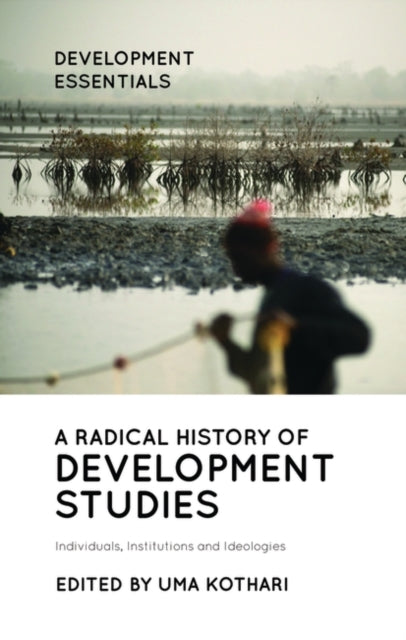Shulph Ink
Radical History of Development Studies: Individuals, Institutions and Ideologies
Radical History of Development Studies: Individuals, Institutions and Ideologies
- Condition: Brand new
- UK Delivery times: Usually arrives within 2 - 3 working days
- UK Shipping: Fee starts at £2.39. Subject to product weight & dimension
Bulk ordering. Want 15 or more copies? Get a personalised quote and bigger discounts. Learn more about bulk orders.
Couldn't load pickup availability
- More about Radical History of Development Studies: Individuals, Institutions and Ideologies
A Radical History of Development Studies explores the evolution of development institutions, discourses, and themes, challenging mainstream theory and practice and highlighting critical discourses. It is a valuable resource for students and scholars.
Format: Paperback / softback
Length: 240 pages
Publication date: 15 September 2019
Publisher: Bloomsbury Publishing PLC
The history of development studies is traced in A Radical History of Development Studies, from the late colonial era to the current emphasis on poverty reduction. In this now-classic genealogy of development, the authors examine the contentious evolution and functions of development institutions and investigate changes in development discourses. Combining personal and institutional reflections with an analysis of key themes such as gender and development, NGOs, and natural resource management, A Radical History of Development Studies challenges mainstream development theory and practice and highlights hidden, critical discourses that have been written out of conventional stories of development. The volume aims to stimulate thinking about the discipline's future directions and provides an essential resource for students grappling with the historical continuities and divergences in development theory and practice.
Introduction:
Development studies has a rich and complex history, tracing its roots back to the late colonial period. Initially, the field was focused on understanding the economic and social changes that occurred in developing countries as they transitioned from colonial rule to independence. However, over time, development studies has evolved to encompass a broader range of issues, including poverty reduction, gender equality, environmental sustainability, and social justice.
The Late Colonial Period:
During the late colonial period, development studies was heavily influenced by the colonial powers' desire to control and exploit the resources of developing countries. The field was characterized by a focus on economic growth and modernization, with little attention paid to the social and cultural implications of these policies. For example, in the 1950s and 1960s, the United States and the United Kingdom implemented large-scale development programs in Latin America and Africa, known as the "Green Revolution." These programs aimed to increase agricultural productivity and improve food security, but they also had negative consequences for local communities, such as the displacement of farmers and the erosion of traditional cultures.
The Post-Colonial Era:
The post-colonial era saw a shift in the focus of development studies towards more critical and nuanced approaches. Scholars began to question the assumptions underlying traditional development theories and practices and to explore alternative approaches that were more inclusive and equitable. For example, in the 1970s, the concept of "dependency theory" emerged, which argued that developing countries were dependent on the economic and political power of the developed world and that their development was hindered by this dependency.
The Rise of NGOs:
In the 1980s and 1990s, the rise of non-governmental organizations (NGOs) played a significant role in shaping the direction of development studies. NGOs were often seen as a way to promote grassroots activism and to challenge the power of the state and international institutions. They worked on a range of issues, including poverty reduction, human rights, and environmental protection, and they often used participatory approaches to engage with local communities.
The Challenges of Development:
Despite the progress that has been made in development studies, there are still many challenges that need to be addressed. One of the most pressing is the issue of poverty reduction. Despite decades of efforts, millions of people around the world continue to live in poverty, and many of these people are located in developing countries. The causes of poverty are complex and multifaceted, including economic inequality, political instability, and environmental degradation.
Conclusion:
In conclusion, A Radical History of Development Studies provides a comprehensive and insightful account of the history of development studies from the late colonial period to the present. The book explores the contested evolution and functions of development institutions, the changes in development discourses, and the challenges facing the field today. By challenging mainstream development theory and practice and highlighting hidden, critical discourses, the book provides an essential resource for students and scholars interested in understanding the complex and multifaceted issues of development.
Weight: 276g
Dimension: 136 x 216 x 20 (mm)
ISBN-13: 9781786997661
Edition number: 2 ed
This item can be found in:
UK and International shipping information
UK and International shipping information
UK Delivery and returns information:
- Delivery within 2 - 3 days when ordering in the UK.
- Shipping fee for UK customers from £2.39. Fully tracked shipping service available.
- Returns policy: Return within 30 days of receipt for full refund.
International deliveries:
Shulph Ink now ships to Australia, Belgium, Canada, France, Germany, Ireland, Italy, India, Luxembourg Saudi Arabia, Singapore, Spain, Netherlands, New Zealand, United Arab Emirates, United States of America.
- Delivery times: within 5 - 10 days for international orders.
- Shipping fee: charges vary for overseas orders. Only tracked services are available for most international orders. Some countries have untracked shipping options.
- Customs charges: If ordering to addresses outside the United Kingdom, you may or may not incur additional customs and duties fees during local delivery.


